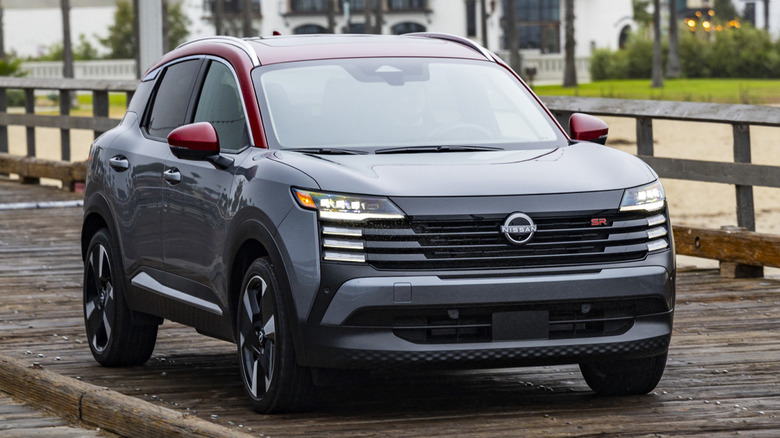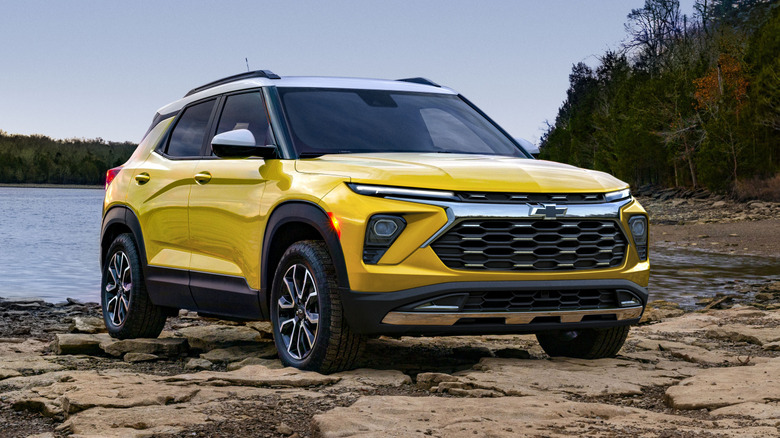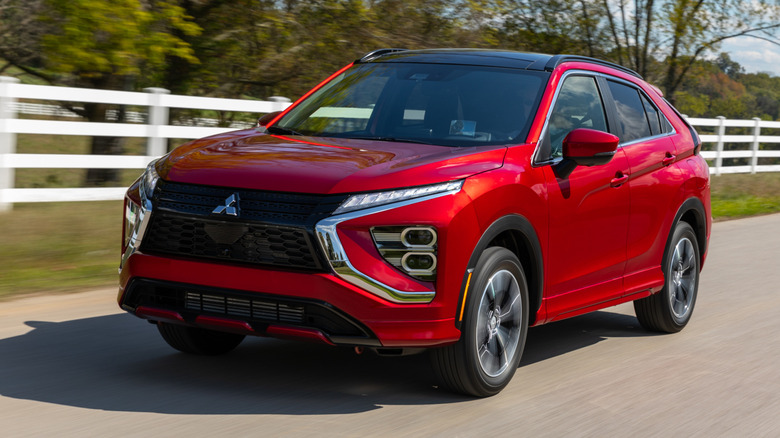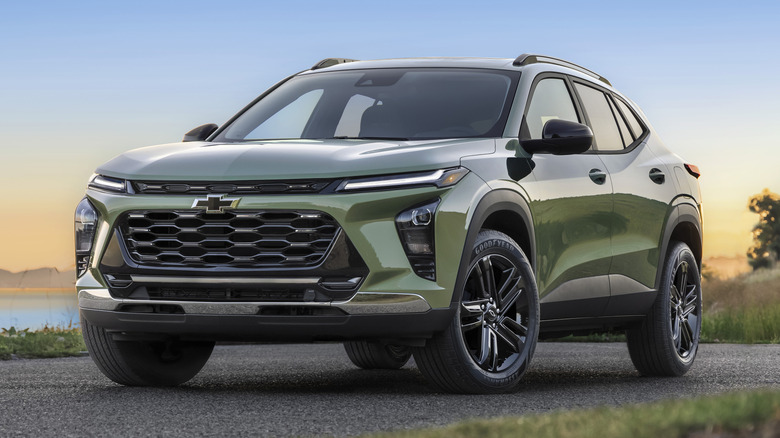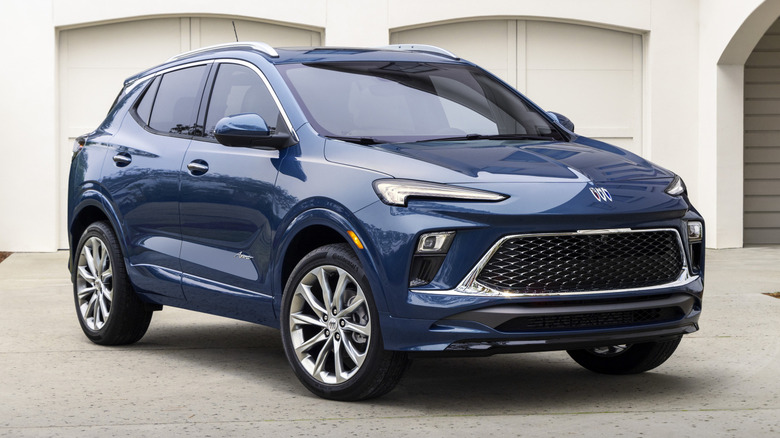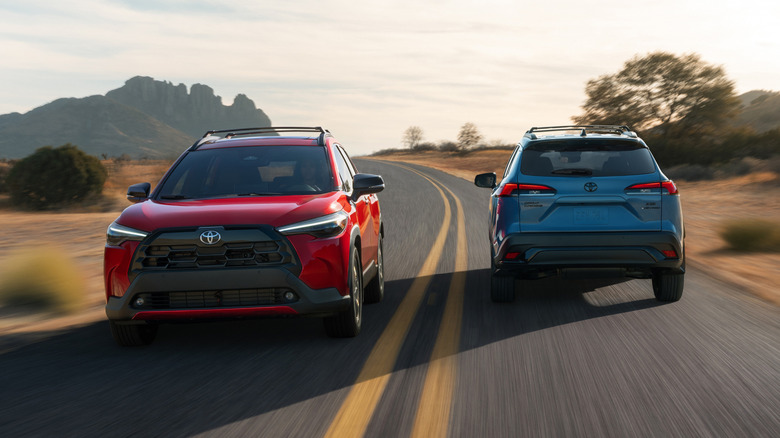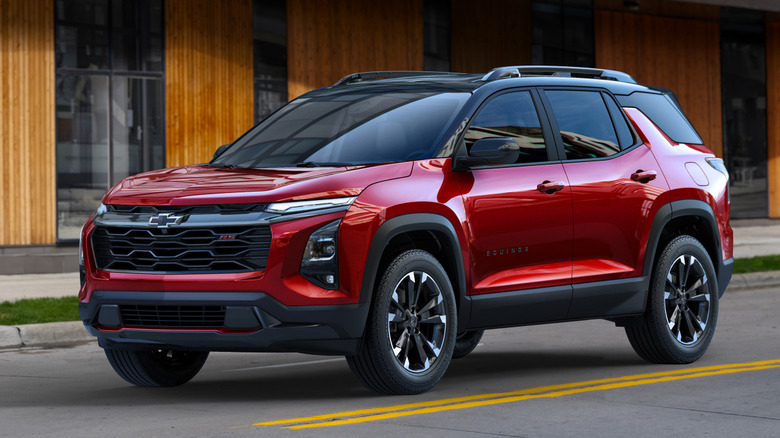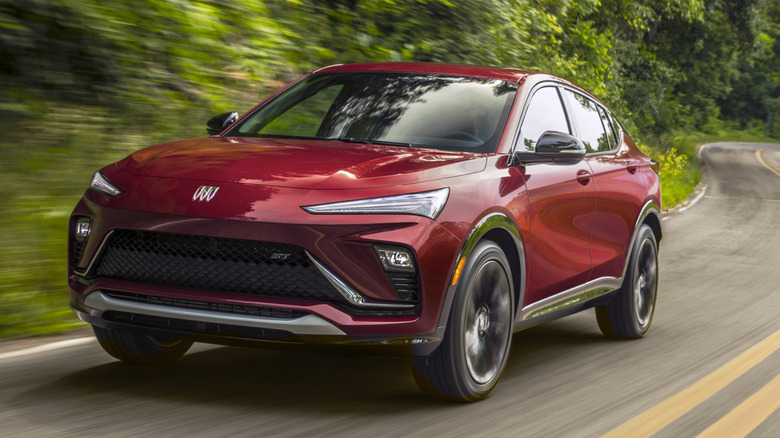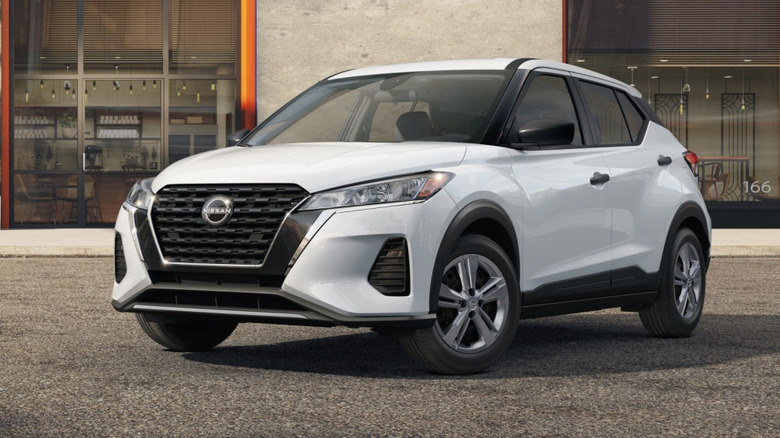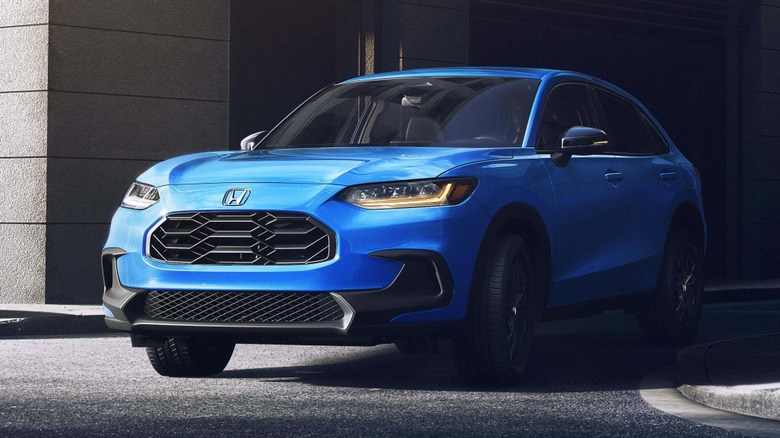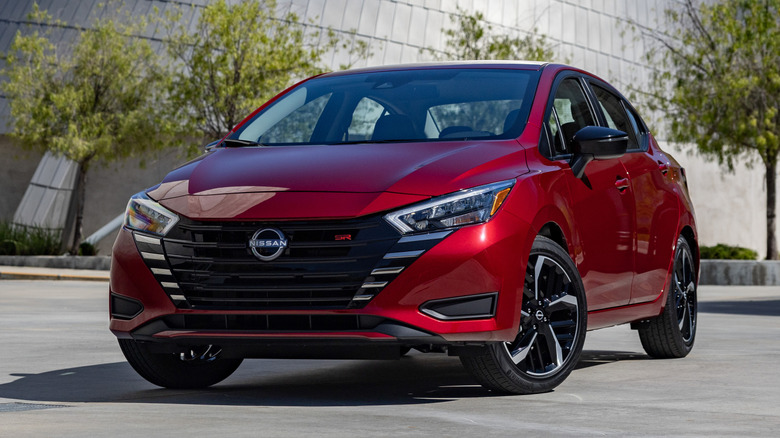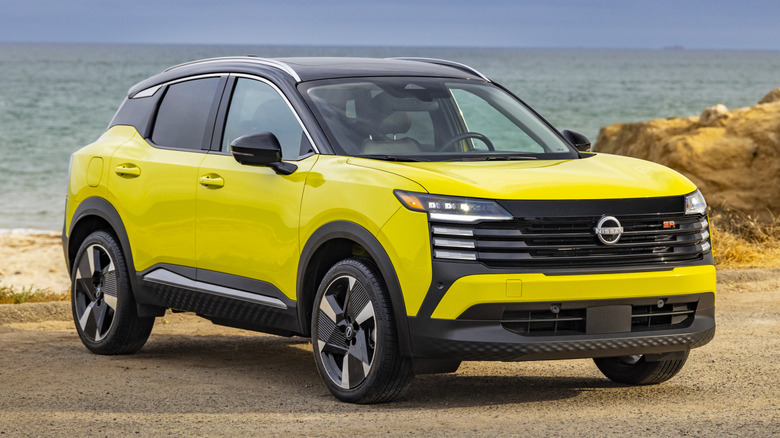12 Of The Slowest Cars You Can Buy In America
Thanks to the increasing popularity of electrified powertrains, even run-of-the-mill cars often now boast respectable acceleration times. Hybrids, plug-in hybrids, and EVs all have a natural advantage, since electric motors can deliver maximum torque straight away. Combustion engines, meanwhile, have to hit higher revs before they can deliver their peak power. That said, even many modern gas-powered cars now accelerate faster than their predecessors. Of course, there are always going to be some exceptions to the rule.
Understandably, manufacturers with particularly slow cars aren't keen to showcase their sluggishness, and so often don't post official zero to 60 mph times for these models. Even when they do, they might not reflect the speeds that drivers can expect to see in the real world. So, to get a more accurate picture of which cars are the very slowest, we've relied on acceleration data from independent testing by Car and Driver and MotorTrend. Across all major market segments, these 12 cars came out among the slowest of all. Each is available as a 2025 model or newer.
Mitsubishi Outlander – 8.6 seconds
Some new cars turn out to be remarkably good, while others turn out to be remarkably bad. We found that the 2025 Mitsubishi Outlander was neither, achieving the unenviable accolade of being acceptable in every respect. It's unenviable because in a market crammed with SUVs each model needs something to stand out from the crowd. The non-hybrid Outlander doesn't really stand out at all, especially since it doesn't have the more frugal hybrid powertrain of its Outlander PHEV sibling. It isn't particularly cheap, with our tester retailing for $45,930, it isn't particularly capable compared to other SUVs, and it isn't particularly fast either.
According to MotorTrend, the non-hybrid Outlander should be good for a zero to 60 mph time of 8.6 seconds. Again, that isn't awful, and it's not like most buyers expect their three-row SUV to shred its tires off the line anyway. Still, it's another tick in the unremarkable box for a car that struggles to make a case for itself among a broad field of rivals.
Chevrolet Trailblazer – 8.7 seconds
The Chevrolet Trailblazer's name might invoke imagery of pioneering power, but the modern Trailblazer will struggle to blaze a trail through anything. The Trailblazer has been subject to a series of complaints from owners, with the most common one being an unexpected loss of power. Other owners have noted infotainment system problems and issues with their cars' brakes.
Even when it does work as intended, the Trailblazer's modest 1.2L three-cylinder engine can only muster 137 horsepower. An optional 1.3L three-cylinder increases power slightly to 155 horsepower. For reference, the top-spec Trailblazer SS of the mid-'00s offered 395 horsepower thanks to the LS2 V8 engine under its hood.
That V8 power was enough to propel the two-decade old Trailblazer SS from zero to 60 mph in a little over five seconds, but today's 1.3L Trailblazer can only manage a best time of 8.7 seconds according to Car and Driver's testing. It might be slower and smaller than its predecessor, but at least the modern Trailblazer is cheap. Prices start around $25,000 for a base-spec example, with a top-spec trim with the (marginally) more powerful 1.3L engine costing just under $30,000.
Mitsubishi Eclipse Cross – 8.7 seconds
In recent years, some automakers have developed an annoying habit of slapping sports car nameplates on their crossovers in a bid to make them seem more interesting. The Ford Mustang Mach-E is perhaps the most well-known example, but Mitsubishi jumped on the trend earlier than most with the launch of its Eclipse Cross crossover in 2018. The original Eclipse was a sporty coupe, while the current Eclipse Cross is a generic family-friendly model that's very difficult to tell apart from every other model in the current Mitsubishi lineup at a glance.
Much like the Chevrolet Trailblazer, the modern Eclipse Cross is far less powerful than previous cars that bore its name. Powering the modern crossover is a 1.5L turbo-four engine which churns out 152 horsepower. Before it was axed, the Eclipse coupe offered 263 horsepower from a 3.8L V6. It shouldn't be a surprise, then, to find out that the Eclipse Cross' zero to 60 mph time is equally unimpressive, with MotorTrend reporting that the sprint to 60 mph takes 8.7 seconds. Prices start from just under $28,000 including destination fee for a base-spec model, and rise to around $32,000 for the top trim.
Chevrolet Trax – 8.8 seconds
After putting the 2025 Chevrolet Trax through its paces, we found that there was plenty to like about the car. For starters, it remains very competitively priced, with base-spec trims starting from around $22,000. Despite that, we didn't think it felt overly cheap inside, and it didn't look like an econobox from the outside either. It might look decent, but drive the car, and its shortcomings become more clear. Its 1.2L three-cylinder engine with its 137 horsepower output is the same engine that appears in the Trailblazer, and it's equally slow in the Trax. Car and Driver recorded an 8.8 second zero to 60 mph time.
Like all the cars here, the Trax's slower zero to 60 mph time isn't necessarily a bad thing, particularly for drivers who rack up most of their miles driving through busy city streets. The Trax also wins points for keeping any pretense of sportiness to a minimum, with Chevy instead pitching it as straightforward, affordable transport. In that regard, it fulfils its brief well, but that doesn't change the fact that it's still one of the slowest accelerating new cars on the market.
Buick Encore GX – 8.8 seconds
The past few years have seen Buick revamp its entire lineup, including discontinuing its Encore crossover. The Encore GX, which is a separate model despite its similar name, remains part of the brand's lineup for now. It starts from around $27,000 for 2025. It received a significant overhaul for the 2024 model year, including styling that took inspiration from the brand's 2022 Wildcat EV concept. However, the Encore GX does not feature an EV powertrain, instead making do with a 1.2L three-cylinder engine with 137 horsepower on tap.
Its Chevy-branded sibling, the Trailblazer, features the same engine, and both cars also offer an optional 1.3L three-cylinder engine with a slightly improved 155 horsepower. Predictably, even the larger engine doesn't do much to increase the Encore GX's zero to 60 mph time, which sits at 8.8 seconds, per Car and Driver. Despite its leisurely acceleration, it isn't the slowest model in Buick's range either.
Toyota Corolla Cross – 9.2 seconds
The Toyota Corolla Cross Hybrid receives a boost from its electric motor, with Toyota estimating that it should be able to reach 60 mph from standstill in eight seconds flat. Anyone who doesn't want to shell out for the hybrid powertrain can also buy a Corolla Cross in non-hybrid guise, but it comes with some compromises. The main one is that it's even slower, with Car and Driver clocking a 9.2 second zero to 60 mph time for the all-wheel drive model.
With either model, the soundtrack of the car's 2.0L four-cylinder gas engine might start to grate. It's louder than many modern cars and sounds strained if it's pushed to any degree. Our review of the hybrid model deemed it "a singularly ear-gnawing experience." Considering the RAV4 isn't that much more expensive than the Corolla Cross — and it's slightly faster off the line to boot — it's hard to find many reasons to recommend the Corolla Cross over its bestselling stablemate. Anyone who does have their heart set on a Corolla Cross will have to cough up at least $25,485 including destination fee to get one.
Chevrolet Equinox – 9.2 seconds
With over 200,000 examples of the car sold in 2024 alone, Chevy is clearly doing something right with the Equinox. It ticks all the boxes for an everyday suburban runabout, with enough space for a family, enough tech features to keep both its driver and passengers happy, and a comfortable ride. The 2025 Chevrolet Equinox has been given an overhaul for the latest model year, but it still offers the same key benefits as the outgoing model. That's great news — the less great news, however, is that it also still offers the same 1.5L four-cylinder engine as the previous generation.
Family-oriented SUVs aren't usually all that fast, but the Equinox still lags behind its competitors. MotorTrend tested the latest car and reported a 9.2 second zero to 60 mph time for the all-wheel drive RS trim. Ironically, Chevy's RS badge stands for Rally Sport, but its performance is neither sporty nor rally-ready. It's safe to assume that most buyers won't be expecting impressive performance figures from their reasonably priced SUV. Still, surely it couldn't have hurt to at least boost the Equinox's performance enough to keep up with its competition.
Buick Envista – 9.3 seconds
With its estimated zero to 60 mph time of 9.3 seconds according to Car and Driver, the Buick Envista is slow. It's even slightly slower than the other Buick and Chevy models that share its 1.2L three-cylinder engine, although the chance of any drivers actually noticing that marginal difference on the road seems small. There's also no all-wheel drive option, unlike Buick and Chevy's pricier SUVs. However, aside from its powertrain, there's plenty to like about the car.
It's cheap, it looks great, and it comes with a decent amount of kit as standard. If buyers want additional equipment, most of its packages are competitively priced too. It's also reasonably efficient, although not quite to the same degree as its hybrid rivals. Prices for the Envista start from around $25,000 at the time of writing, which makes it one of the cheapest SUVs on the market. We think it's also one of the nicest base model cars for the money, despite its modest powertrain.
Nissan Kicks Play – 9.7 seconds
The Kicks Play nameplate is a new one for 2025, but the car itself will be familiar to Nissan buyers. The brand launched an all-new version of the Kicks for the new model year, but decided to continue selling the previous generation model alongside it as the Kicks Play.
It's one of the cheapest new cars on the market, starting from just under $23,000 including destination fee. At that price point, it should be no surprise that it's not powerful, nor is it fast. After testing the car back when it was known as the Kicks, Car and Driver could only achieve a 9.7 second sprint to 60 mph.
It's still not the slowest car on the market though, and its 122 horsepower four-cylinder engine offers enough speed for urban journeys. It also isn't quite the cheapest SUV on the market — that honor goes to the Hyundai Venue — but it's pretty close. As budget-friendly everyday transport for cash-strapped drivers, the Kicks Play remains a solid option, despite sharing dealership space with its newer Kicks sibling.
Honda HR-V – 9.8 seconds
We reviewed the Honda HR-V at the start of the current generation, giving it a commendable 9 out of 10 rating. The car is much like most other Japanese economy cars, focusing on sensibility, efficiency, and practicality over driver enjoyment. We didn't think that it felt unusually slow on the road, but testing by MotorTrend returned a 9.8 second zero to 60 mph time. That's enough to put toward the very bottom of its segment, and among the very slowest cars on sale in 2025.
Evidently, it lacks the performance figures to keep up with its competitors, but in the mountains of Virginia, our reviewer found its grunt to be more than adequate. Plus, performance only forms part of the equation for any entry-level crossover — arguably the bigger issue is its price. In that regard, the HR-V remains a solid contender in its segment, with prices starting from $27,595 including destination fee for 2026.
Nissan Versa – 10.0 seconds
Many of the cars that made this list follow a similar formula — they're SUVs or crossovers with small engines and competitive price tags. The Nissan Versa isn't an SUV or crossover, but it follows the formula in all other ways.
It offers a 1.6L four-cylinder engine with 122 horsepower that can drag the car from zero to 60 mph in a sluggish ten seconds flat according to MotorTrend. In base-spec form, it can be bought for as little as $18,330, making it the cheapest new car on the market in 2025. Only the Mitsubishi Mirage, which was discontinued after the 2024 model year, can potentially be found cheaper.
At that price, it's unfair to criticize the Versa's lackluster powertrain too much. Nissan is now the only manufacturer left that still offers a car for less than $20,000 in 2025, although it might not stay that way. The brand has warned that it might have to raise prices thanks to the effects of the current government's tariffs, although the extent of these price increases remains unclear as of this writing.
Nissan Kicks – 10.4 seconds
Just like the Versa and its Kicks Play sibling, the latest Nissan Kicks was never going to be a performance car. However, it's still surprising that, according to MotorTrend's testing, the Kicks is actually slower to 60 mph than the previous generation model by over half a second. If anything, that just makes the Kicks Play, which is the previous generation Kicks with a new name, even more of an appealing deal.
Performance aside, the Kicks delivers just about everything that would be expected of it given its starting price of $23,200. It offers Apple CarPlay and Android Auto, both available with a wireless connection in higher trims, and there's a 360-degree camera and automatic climate control in top-spec examples. There's even an optional Bose audio system that punches above its weight given the car's price. Its interior isn't particularly memorable, and neither is its performance, but it doesn't need to be.
All three of Nissan's most affordable models might be among the slowest cars on the market, but for the right buyer, they're still worth considering.
